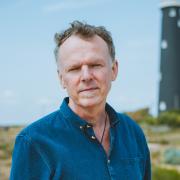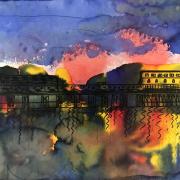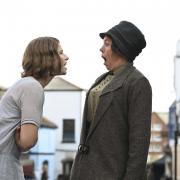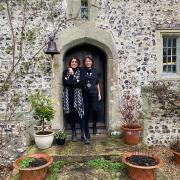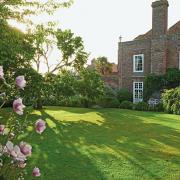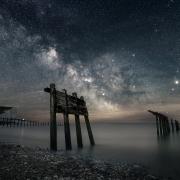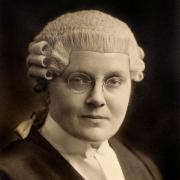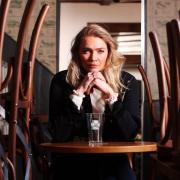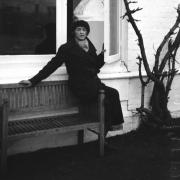Brazilian-born but Hastings-based artist Claudia De Grandi is using big canvases to reconnect with elemental nature. Duncan Hall visited her studio

From the position of her studio high on the Ridge with Hastings spread out below, it’s perhaps no surprise that the sea plays a big part in Claudia De Grandi’s abstract landscapes.
But in fact it wasn’t the English Channel but the Pacific Ocean which inspired her latest collection of large, almost immersive paintings, many of which take the title of Horizon. “I went to northern California, close to Oregon,” she says. “I had never really contemplated the ocean before – the difference really struck me. I took pictures of the abstract elements, the waves, the intensity and the lines.” Indeed there are small photos and picture printouts attached to the walls around Claudia’s studio, which is hidden away in the upper storey of a nondescript industrial estate building. They accompany her large canvases which are suspended from the walls using an ingenious system of homemade hooks to get them to the right height.
Claudia’s work is designed to be experienced in situ – in a similar way to the 20th century abstract expressionist Mark Rothko. What makes her work more accessible is its basis in landscape or movement – she has also done a series of Visual Sounds paintings inspired by improvised electronic music performed by collaborator Joshua Tennant. “People have said to me if Rothko and Turner had a baby I would be that baby,” she says. “When you’re listening to music you’re transported to a space. I try to create a space that is peaceful like the sea. It’s about reconnecting with nature – what has been given to us, and what we can’t take for granted. I want people to look at my paintings and feel some kind of memory of the sea or some connection with nature, or even find some sounds in it.”
The horizon is central to many of her recent paintings, although the distinct line has been noticeably fading as time goes on. “When I was working more closely with Joshua I was doing a lot of trips to Berlin,” says Claudia. “It is a dark place, it’s cold and not so connected to nature. I was making a lot of night works. When you stop and look you start to see the horizon a bit more. It’s interesting for me as the point where the sky meets the earth – you can never reach the horizon. It’s how I feel about art. I like to make art where it encourages people to see rather than just look at something.”

She sees art as a reconnection with something beyond, which is increasingly essential in a time of anxiety – especially for the young who have grown up connected to social media and suffered its enervating effects. Her two grown-up children have experienced nothing but an internet-connected world. “Both of them have reported to me how their generation is very anxious,” she says. “They are absorbed by it, and that worries me. I feel as an artist my contribution is to recreate this space where people can remember what they are.”
Claudia, 52, grew up in Sao Paulo to a Brazilian mother and Italian father. She moved to the UK 30 years ago, initially living in Wadhurst before moving to Catsfield, near Hastings, 12 years ago. She is classically trained in the piano having studied at a Sao Paolo conservatoire. She feels both the influence of studying music and her Brazilian upbringing can be seen in her work – particularly in its minimalist leanings. “I grew up with an eastern influence,” she says, having studied the eastern influence on Brazilian art for her MA. “There is a Zen and Buddhist tradition and spiritual approach to mark-making with calligraphy. There was a big surge of Japanese immigrants to Brazil at the end of the 1800s. Everything I do is a bit minimalist and Zen. Everything I did before I started my art has contributed – nothing has been wasted!”
She enjoys the supportive atmosphere of being in Hastings: “I like the music scene and events like Fat Tuesday where they play live music in the pubs. I like walking to the sea. I have lots of artist friends who talk about their projects which is very inspiring.”
There is the chance of a future collaboration with fellow Hastings-based landscape artist Alan Rankle, who showed her work in a Milan exhibition he organised earlier this year. “Alan wants to do some diptychs of his work and my work,” she says. “He’s a landscape painter and I’m a landscape painter – his work is more representational and I’m more abstract. When you put them together they really work.”
She also has a series of photographs she took from the plane while travelling to the US, which could form the basis of another series. She sees her Visual Sounds paintings as having come to a close, but she would like to do an artistic performance with music in the future. When she talks to Sussex Life she’s preparing for a trip to Brazil. “I want to do some very large paintings when I come back,” she says. “I might have a different influence – last year I was doing lots of big blues and whites. I don’t know what the next phase will be – allowing yourself to not know where you are is not a bad thing!”
Good to know
Claudia is opening her studio in Block Two, Unit 8 of Brook Way Business Park, Ivy House Lane, TN35 4NN on Saturday 9 and Sunday 10 June 2018 from 2pm to 6pm to show her series Horizonsand Waves. Other visits are by appointment only – please email claudiadegrandis@gmail.com.
More…
• Dave Walsh at Eternal Guitars in Chichester - Dave Walsh of Chichester-based Eternal Guitars has turned his teenage passion into a successful business, supplying youngsters buying their first instruments right through to international performers






